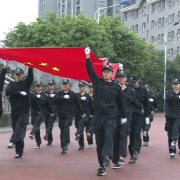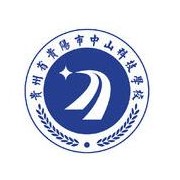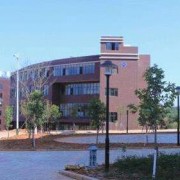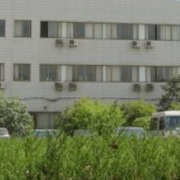初一上学期英语?求初一上册的英语基本句型
来源:择校网 时间:2025-02-15 05:30:17
一、求初一上册的英语基本句型
句型和词组(七年级上Go for it)
Starter Us1-3
1.Good morning/afternoon/evening, Bob!早上/下午/晚上好,Bob!
2.Good morning to you.祝你早上好。
3.--How are you?你好吗?
—I’m fine, thanks. How are you?我很好,谢谢。你好吗?
---I’m OK.我还好。
4.---What’s this in English?用英语表达这是什么?
—It’s an orange.它是一只桔子。
—Spell it, please.请拼写它。
—O-R-A-N-G.
---Thank you.谢谢。
Thank you very much/a lot.-----You are welcome.=That’s all right.=That’s OK.不用谢。
5.--What color is it?它是什么颜色?—It’s red.红色。
6.The key is yellow.钥匙是黄色的。=It’s a yellow key.它是黄色的钥匙。
7.Nice to meet you.很高兴见到你。----Nice to meet you, too./Me,too.也很高兴见到你。
8.How do you do?你好!----How do you do?你好!
Unit One
1.---What’s your name?你的名字是什么?
2.—My name is Gina.我的名字是吉娜。=I’m Gina.我是吉娜。
3.What’s his name?---His name’s Tommy.
4.What’s her name?—Her name is Jenny.
5.―Nice to meet you.很高兴认识你。—Nice to meet you,too.也很高兴认识你。
6.-What’s her phone number?她的电话号码是多少?
7.—Her telephone number is 535-2375.她的电话号码是535-2375.
8.-What’s his family/last name?他的姓是什么?
—His family/last name is Brown.他的姓是布朗。
9.-What’s her first name?她的名字是什么—Her first name is Linda.她的名字是琳达。
U2
1.Is this your pencil?这是你的铅笔吗?—Yes, it is.是,它是。
2.Is that your dictionary?那是你的词典吗?---No, it isn’t.不,它不是。
3.How do you spell eraser?你怎样拼写eraser?
4.Can you spell eraser?你能拼写eraser吗?
5.in the lost and found case在失物招领箱里
6.call Alan at 495-3539给艾伦打电话495-3539
7.school ID card校牌
8.a set of keys一串钥匙
U3
1.Is this your daughter?这是你的女儿吗?—Yes, it is.是,它是。/No, it isn’t.不,它不是。
2.Those are my two brothers.那些是我的两个兄弟。
3.Is she your aunt?她是你的姨母吗?—Yes she is.是,她是。/No,she isn’t.不,她不是。
4.family tree家谱
5.Thanks for the photo of your family.谢谢你的全家照。
6.Here is my family photo.这儿是我的全家福。 7.This is my mother.这是我母亲。
5.a photo of your family=your family photo你的全家福
U4
1.Where is the backpack?背包在哪里?—It’s under the table.它在桌子下面。2.Where are my books?我的书在哪里?—They’re on the sofa.他们阿子沙发上。3.Where are his keys?他的钥匙在哪里?—They’re on the dresser.他们在柜子上。4.Is it on the floor?它在地板上吗?—No, it isn’t.不,它不在。5.Sorry, I don’t know.对不起,我不知道。6.Are they in the drawer?他们在抽屉里吗?—Yes, they are.是,他们在。7.The CDs are in the drawer.激光唱片在抽屉里。8.take these things to your sister把这些东西带去给你姐姐9.bring it to school把它带到学校来
U5
1.Do you have a ping-pong ball?你有乒乓球吗?
—Yes, I do.是,我有。/No, I don’t.不,我没有。2.I/We/You/They have a tennis racket.我/我们/你们/他们有网球拍。3.I/We/You/They don’t have a tennis racket.我/我们/你们/他们没有网球拍。4.Does he have a soccer ball?他有足球吗
—Yes, he does.是,他有。/No, he doesn’t.不,他没有。5.He/She/Tom has a soccer ball.他/她/Tom有足球。6.He/She/Tom doesn’t have a soccer ball.他/她/Tom有足球。7.Let’s play tennis/basketball.让我们打网球/篮球吧。8.That sounds good.那听起来真好。9.play sports做运动 10.watch them on TV通过电视看它们11.have a great sports collection有大量的体育收集品12.every day每天 13.five volleyballs五只排球
U6
1.Do they like pears?他们喜欢梨吗?
—Yes, they do.是,他们喜欢。/No, they don’t.不,他们不喜欢2.They/I/We like hamburgers.他们/我/我们喜欢汉堡包。3.Does she like ice cream?她喜欢冰淇淋吗?—Yes, she does.是,她喜欢。/No, she doesn’t.不,她不喜欢。5.running star跑步明星 6.lots of=a lot of许多 7.healthy food健康食品8.What does he have for lunch?午餐他要吃什么?---He has chicken, carrots and broccoli for lunch.午餐他要吃鸡肉,胡萝卜和花椰菜。9.What do you like for dinner?晚餐你喜欢吃什么?
—I like vegetables for dinner.晚餐我喜欢吃蔬菜。10.go on a picnic=have a picnic去野餐11.make a list of food to buy列出需要购买的食物
12.ask questions问问题 13.answer questions回答问题
14.I also like strawberries.=I like strawberries, too.我也喜欢草莓。
U7句型
1.How much is this T-shirt?=What’s the price of this T-shirt?-It’s seven dollars.这件T恤衫多少钱?-7美元。
2.How much are these socks?-They’re two dollars.这些短袜多少钱?-2美元。
3.Can I help you?=What can I do for you?=Is there anything I can do for you?我能帮你吗?4.I want/need a sweater.=I want to buy a sweater.我想(买)一件毛衣。5.I want to buy a pair of pants.我想买一条长裤。
6.I’ll take it/them.我要买它(们)。
7.Here’s the money.给钱。
8.The price of the watch is low/high.手表的价格是低的/高的。
9.The watch is cheap/expensive=dear.手表是便宜/昂贵的。
10.We need to learn English well.我们必须学好英语。
11.My watch needs mending.我的手表需要修理。
12.Here is a pair of shoes.这儿有双鞋。
13.Here are shoes.这儿是鞋子。
14.What color do you want?你要什么颜色?
15.We have great bags for only 18 yuan.我们有只售18元的大包。
16.We sell pants for only 30 yuan.我们的长裤只卖30元。
U7词组
T-shirts in red=red T-shirts穿红色T恤衫 come and see for yourself亲自来看看 come to my store来我的店 come here来这儿 next to隔壁 have a sale=on sale在廉售 take/make notes作笔记 be on sale for 25 yuan以25元廉售have a look at=look at看……
buy me a watch=buy a watch for me买给我一块手表 sell well销路好
buy a watch from the watch store从手表店买来一块手表
buy the socks for only 5 yuan each以每双5元买来袜子
sell me the bike=sell the bike to me卖给我自行车
sell the bike for 100 yuan以100元卖了自行车
can afford our prices能承担得起我们得价格
can’t afford to buy a house买不起房子
Mr Cool’s clothing store库尔先生得服装店
U8句型
1.When is your birthday?你的生日在什么时候?
2.My birthday is October 10/10th/tenth.=It’s October 10/10th/tenth.我的生日在十月十日。
3.The first month of the year is January.=January is the first month of the year.一月是一年的第一个月。
4.How old are you?=What’s your age?你几岁?
5.I’m fifteen years old.=I’m fifteen/15.=Fifteen.我十五岁。
6.How old is he/she?他/她多大?
7.What’s the date today?=What date is it today?今天是几月几日?
8.It’s December 2.是十二月二日。
9.When were you born?你什么时候出生?
10.I was born on February 12th,1993.我出生在1993年二月十二日。
11.In which year were you born?你是哪一年出生的?
12.I was born in 1995.我是1995年出生。
13.When was he/she born?–He/She was born on December 25th,1642.他/她何时出生?他/她1642年十二月二十五日出生。
14.When is the basketball game?篮球赛在何时?
U8词组
October 1st/1/first读作:October the first十月一日
1/1st/first October读作:the first of October十月一日
your mother’s birthday你妈妈的生日 date of birth出生日期
how old几岁 fifteen years old 15岁
an old man一位老人 an old bike一辆旧自行车
have an English speech contest举行英语演讲比赛 Dave’s birthday party大卫的生日晚会 school trip学校旅行 have/hold a volleyball game举行排球赛
have an Art Festival举行艺术节 Music Festival音乐节 at your school在你的学校 have a School Day举行校庆
have an English party举行英语晚会 at the party在晚会上
welcome party欢迎会 farewell party欢送会
Party member党员 at 3:00在三点
at breakfast/lunch/supper在早餐/午餐/晚餐时
in the morning/afternoon/evening在早上/下午/晚上
in 2005在2005年 in August在八月
in spring/summer/autumn/winter在春天/夏天/秋天/冬天
on Friday在星期五
on Friday morning=on the morning of Friday在星期五早上
on March 12th在三月十二日 on his birthday在他的生日(那天) on Women’s Day在妇女节
read it to the class把它读给全班同学听 Joe’s calendar乔的日历
Tom and Tim’s mother Tom和Tim的母亲 Tom’s and Tim’s rooms Tom的和Tim的房间
Teachers’ Day教师节 go on a trip去旅行 be on a trip在旅行
节日:
New Year’s Day(January 1st)元旦 Tree Planting Day(March 12th)植树节 Women’s Day(March 8th)妇女节
Mother’s Day(the 2nd Sunday of June)母亲节 Children’s Day(June 1st)儿童节
Father’s Day(the 3rd Sunday of June)父亲节 Army’s Day(August 1st)建军节
Mid-autumn Day中秋节 Teachers’ Day(September 10th)教师节
National Day(October 1st)国庆节 Thanksgiving Day(the 4th Thursday of Novembe感恩节
Christmas Day圣诞节
the Spring Festival春节
U9句型
1.Do you want to go to a movie?Yes,I do./No,I don’t.你想去看电影吗?是。/不,我不想。
2.Does he want to go to a movie?Yes,he does./No,he doesn’t.他想去看电影吗?是。/不,他不想。
3.He doesn’t want to go to a movie.他不想去看电影。
4.He wants to go to a movie.他想去看电影。
5.I like thrillers and I like action movies.我喜欢恐怖片我喜欢动作片。
6.I like comedies but I don’t like documentaries.我喜欢喜剧片但我不喜欢记录片。
7.She likes thrillers but she doesn’t likeBeijing Opera.她喜欢恐怖片但她不喜欢京剧。
8.He doesn’t like comedies and he doesn’t thrillers.他不喜欢喜剧片他不喜欢恐怖片。
9.What kind of movies do you like?你喜欢哪种电影?
10.What do you think of them?=How do you like them?你觉得它们怎样?
11.I think they’re exciting.我认为他们是令人兴奋的。
12.I don’t think they’re scary.我认为他们是不吓人的。
13.Do you think they’re interesting? Yes, I think so./No,I don’t think so.你觉得它们有趣吗?是,我认为是这样的。/不,我认为不是如此。
14.My favorite actor is Paul Jackson=I like Paul Jackson best.=Paul Jackson is my favorite.我最喜欢的演员是Paul Jackson。=我最喜欢Paul Jackson。=Paul Jackson是我最喜欢的。
15.It’s an interesting comedy.=The comedy is interesting.它是一部有趣的喜剧。
16.I am interested in comedies.我对喜剧感兴趣。
17.She with her friends often goes to see a movie on weekends.=She often goes to see a movie on weekends with her friends.=She and her friends often go to see a movie on weekends.在周末她经常和她的朋友去看电影。
U9词组
an action movie一部动作片
go to a movie=go to movies=go to the cinema=go to see a film去看电影
go to see a thriller/comedy/documentary去看恐怖片/喜剧片/记录片
go to see Chinese action movies去看中国功夫片
really like真地喜欢
find someone who likes..找到喜欢….的人
learn a lot/much/a little/little/nothing/something/everything about Chinese history了解很多/很多/一些/几乎没有/没有/一些事情/所有关于中国历史
go to see Beijing Opera with her father和他父亲一起去看京剧
my favorite actor/actress我最喜欢的男演员/女演员
a very successful thriller一部非常成功的恐怖片
a new movie一部新电影 on weekends在周末
an interesting movie一部有趣的电影 Shaolin Temple少林寺 student’s name学生的名字
like…a lot/very much非常喜欢…. what kind of shows什么节目
U10
1.Can he sing and dance?Yes,he can./No,he can’t.他会唱歌和跳舞吗?是,他会./不,他不会.
2.He can sing and dance.他会唱歌和跳舞.
3.He can’t sing or dance.他不会唱歌和跳舞.
4.Can he sing or dance? He can sing.
5.I want to join the art club.我想参加艺术俱乐部.
6.He wants to join the swimming club.他想参加游泳俱乐部.
7.What club do you want to join?你想参加什么俱乐部?
8.What can you do?你会做什么?
9.Tom can play the guitar but he can’t play it well.Tom会弹吉他但他弹不好.
10.Are you good with kids?你能带好孩子吗?
11.We need help for our Beidaihe School Trip.我们北戴河学校需要帮助.
12.Can you help kids with swimming?你能在游泳方面帮助孩子们吗?
13.Come and join us!快来加入到我们中来吧!(快来应聘吧!)
14.You can be in/join our school music festival.你能加入我们学校音乐节.
15.Come and show us!来展示一下你的才能吧!
16.May I know your name?=What’s your name?我可以知道你的名字吗?
17.May/Could/Can I do…?答语:Yes,please./Sure./Certainly./Of course./OK./All right../Yes, you may/can./否定:No.you can’t./No,you mustn’t./I’m sorry,but….
18.Thanks a lot.=Thanks very much.=Thank you very much.多谢.
19.Why do you want to join the club?—Because I want to learn about art.你为什么想参加俱乐部?---因为我想学习艺术.
U10词组
play chess下国际象棋
play cards打牌
play the guitar/piano/drums/trumpet弹吉他/钢琴/击鼓/吹喇叭
speak English讲英语
the swimming/music/chess/English/art club游泳/音乐/象棋/英语/艺术俱乐部
what club=which club=what kinds of clubs什么俱乐部
play the trumpet very well喇叭吹得非常好
take turns to do sth轮流做某事
job interview职位面试
be good with sb=get on well with sb.与某人相处好
be good at( doing) sth.擅长于做某事
be good/kind to sb.对某人好
be good for sb/sth对某人/某事有好处
help sb.with doing sth帮某人做某事
help sb(to) do sth.帮某人做某事
musicians wanted for…为…招聘音乐人
our rock band我们的摇滚乐队
e-mail me at cindyj@pep.cn给我发电子邮件cindy@pep.cn
do Chinese kungfu使中国功夫
school show学校公演
show sb th=show sth to sb把某物给某人看 eg.show the book to me=show me the book把这本书给我看
show it/them to sb.把它/它们给某人看
in the music room在音乐室
draw a little画一点儿
speak a little English说一些英语
like….a little有点喜欢
a little fast有点快
a little u=some u eg. There’s a little milk in the glass.=There is a little milk in the glass. He can speak a little English.玻璃杯里有一些牛奶。
a few c=some pl.eg.I have a few friends here.=I have some friends here.这儿我有一些朋友。
little u.几乎没有 eg.There’e little food for super.几乎没有晚餐的食物。
few pl.几乎没有eg.There are few people in the street.街上几乎没人。
learn about art学习关于艺术
learn to do sth学会做某事
learn sth from sb向某人学某事
an e-mail address一个电子邮件地址
fill in the timetable填入到时间表中
U11句型
1.What time is it?=What’s the time?几点了?----It’s six o’clock.六点了。2.What time/When do you usually get up?你通常什么时候起床?—I usually get up at five o’clock..我通常五点起床。3.What time does she usually do her homework?她通常几点做作业?---She usually does her homework at 5:30.她通常5:30做作业。4.Does she usually do her homework at seven pm?她通常下午七点做作业吗?---Yes,she does./No,she doesn’t.是。/不,不是。5.What a funny time to eat breakfast!吃早饭多么有趣啊!
感叹句:
(1)What a/an adj. sl. 主语+谓语eg.What a good boy he is他是个多么好的男孩啊
(2) What adj. pl. 主语+谓语eg.What good boys they are!他们是多么好的男孩啊
(3) What adj. u+主语+谓Eg.What cold water it is!多么冷的水啊
(4) How adj. 主语+谓语eg.How good the boy is!这男孩多好啊
(5) How adv. 主语+谓语eg.How well he plays the guitar!他吉他弹得多好啊
7.---What is his job?=What does he do?=What is he?他干什么工作?
---He is a guitarist.=His job is a guitarist.=His job is to play the guitar.他是一位吉他手。
8. I t’s time for sb.to do sth.该是某人做某事的时候了。eg.It’s time for us to go home.该我们回家的时候了。
9. Thanks/Thank you for sth.为某事而感谢你。 Thanks for your letter.谢谢你的来信。
10.Thanks for doing sth.为做某事而感谢你。 eg.Thanks for helping me.谢谢你帮我。
11. Please write them down.=Write them down,please.请把它们记下来。Don’t write them down,please.=Please don’t write them down.请不要把它们记下来。
12. Best wishes to sb for sth.因某事而致以某人最美好的祝愿。 eg.Best wishes to you for New Year!致以新年最美好的祝愿!
13.---When do people usually eat dinner?人们通常何时吃晚餐?---People usually eat dinner in the evening.人们通常晚上吃晚餐。
U11词组
1.what time什么时候 2.get up起床
3.go to school上学 4.go to work上班
5.go home/there回家/去那里 6e here来这里
7.eat/have breakfast/lunch/dinner吃早/午/晚餐 take/have a shower洗澡
8. one…the other…一个…另一个…
11.时间表达法:
(1)eg.8:00am读作:eight o’clock/eight am/eight
(2)8:10am读作:eight-ten am/in the morning/ten(minutes) past eight am/in the morning
(3)8:15读作:eight-fifteen/a quarter past eight
(4)8:30读作:eight-thirty/half past eight
(5)8:45读作:eight forty-five/a quarter to nine
(6)21:00读作:twenty-one o’clock/nine pm
12.work very long hours工作很长时间 two hours and a half=two and a half hours两小时半
13.brush his teeth刷牙
14.eat his breakfast吃早饭
15.after breakfast早餐后
after class下课后 after school放学后 after work下班后
after the English class英语课后
16.get to work到达上班(地点) get to school到校 get home/here/there到家/这儿/那儿 17. take the number 17 bus to a hotel乘17路公交车到旅馆
18.take/catch a bus/car/train/plane to sp.=go to sp.by bus/car/train/plane乘公交车/小汽车/火车/飞机去某地
19.take a bus/train/plane to sp=go to sp.on the/a bus/train/plane
take a car/taxi to sp=go to sp in a/the car/taxi
20.ride a bike to sp.=go to sp. by bike=go to sp on a/the/one’s bike骑自行车去某地
21.all night整夜 all day整天 all of us/them我们/他们全都
All(of) the students are in the classroom.所有学生在教室里。
All(of) the food is on the table.所有食物在桌子上。
22.love to do=like to do喜欢做
23.listen to him听他讲 listen to music听音乐 listen to the radio听收音机
24watch morning TV看早间电视
25.in the morning在上午 in the afternoon在下午 in the evening在晚上
in the night=at night在夜里 Good night!晚安!
26.know a lot/much/a little/little/something/everything/nothing about sb/sth关于某人/某事知道多/一点/几乎没有/一些事/每件事/什么也没有 know about my morning知道关于我的早晨
tell sb sth告诉某人某事 eg. tell him your address告诉他你的地址
tell sb(not) to do sth告诉某人(不)做某事 eg. tell us(not)to go out告诉我们(不)要出去 tell a story讲故事 tell a lie说谎
U12句型
1---What is your favorite subject?=What subject is your favorite?=What subject do you like best?你最喜欢什么科目?---My favorite subject is science.=Science is my favorite subject.=I like science best.我最喜欢自然科学.
2.Why do you like science?你为什么喜欢自然科学?---Because it’s interesting.因为它有趣.
3.Who is your art teacher?谁是你的美术老师?---My art teacher is Mrs Jones.我的美术老师是琼斯太太.
4.When does he have math?他什么时候上数学课?---He has math on Wednesdays.他每个星期三上数学课.
5.What day is it today?今天星期几?---It’s Friday.=Today is Friday.今天星期五.
6.What’s the date today?What date is it today?今天几月几日?---It’s December 30th,2005.今天是2005年十二月三十日.
7.It’s Tuesday,November 11.今天是十一月十一日星期二.
8.Why doesn’t he like music?他为什么不喜欢音乐?
9.I don’t like any subject.我不喜欢任何科目.
10.I like to play with my dog.我喜欢和狗玩耍.
11.Sunday is the first day of the week.星期天是一个星期的第一天.
U12词组
my art teacher我的一位美术老师
an English teacher一位英语老师
favorite TV show最喜欢的电视节目
your parents’ favorite things你父母最喜欢的东西
two times=twice两次 one time=once一次
her mother’s favorite city她母亲最喜欢的城市 on Saturday在周六
be free有空的 be busy with sth忙于某事
be busy(in) doing sth忙于做某事 have math=have a math class上数学课
next year明年 at last最后
be strict with me对我严格要求
be strict in sth对某事严格要求
二、初一英语上册知识点有哪些
初一英语上册知识点人教版一、48个国际音标及26个英文字母的正确书写要熟练掌握元音和辅音,5个元
音字母(a, e, i, o, u),字母的正确占格及单词间距。二、be动词的用法be动词有三种变形,分别是
:am, is, are。记忆口诀:“我”用am,“你”用are, is用于“他、她、它”;单数全都用is,复数全
部都用are。三、人称及人称代词的不同形式(主格和宾格)1、三种人称:第一人称(I, we),第二人
称(you, you),第三人称(he, she,it, Maria)。2、人称代词的主格,即人称代词位于句子主语位置
时的形态:I, We, You, You,He, She, It, Maria。3、人称代词的宾格,即人称代词位于句子宾语位置
时的形态:me, us, you, you,him, her, it4、形容词性物主代词:
my, our, your, your, his, her, its, their。5、名词性物主代词:
mine, ours, yours, yours, his, hers, its, theirs。6、反身代词:
myself, ourselves, yourself, yourselves, himself, herself, itself,themselves。四、基数词(表
示数量多少的词,大致相当于代数里的自然数)
zero, one, two, three, four, five, six, seven, eight, nine, ten, eleven, twelve,thirteen, fo
urteen, fifteen, sixteen, seventeen, eighteen, nineteen, twenty,twenty-one, twenty-
two, twenty-three,twenty-four, twenty-five, twenty-six,twenty-seven, twenty-eight, twenty-
nine, thirty, forty, fifty, sixty,seventy, eighty,ninety, one hundred,one hundred and one。
五、一般疑问句及特殊疑问句1、一般疑问句:能用Yes或No来回答的问句。一般疑问句句尾读升调。2、
特殊疑问句:不能用Yes或No来回答的问句。特殊疑问句句尾读降调。六、可数名词变复数可数名词变复
数时,有规则变化和不规则变化两种。1、规则变化:1)一般情况直接在词尾加“-s”,如: cake-
cakes, bag-bags, day-days, face-faces,orange-oranges等;2)以s, x, sh, ch结尾的词,要在词尾
加“-es”,如:bus-buses, watch-watches,box-boxes等;3)以辅音字母加y结尾的词,变y为i再加“
-es”,如:baby-babies,country-countries, family-families等;4)部分以f(e)结尾的词,变
f(e)为“ves”,如:knife-knives, half-halves等;5)以o结尾的词,加“-s”或“-es”,如
: zoo-zoos, photo-photos, tomato-tomatoes,potato-potatoes等。记忆口诀:除了“英雄”hero外,
凡是能吃的,加“-es”,不能吃的加“-s”。2、不规则变化:初一英语自我介绍(1)自我介绍(2
)1)改变单数名词中的元音字母:man-men, woman-women, foot-feet, tooth-teeth等;2)单、复同形
:sheep-sheep, Chinese-Chinese, Japanese-Japanese等;3)其他形式:mouse-mice, child-children
等。七、简单句的成分及主谓一致原则最基本构成:主语 谓语 宾语,其中谓语由动词来充当。主谓一致
原则,就是句子的谓语要始终与主语保持数量上的一致性。当主语是第三人称单数(简称“三单”)时,
谓语动词也要相应变成单数形式;当主语非“三单”时,谓语动词就用原形。实意动词变“三单”的规则
如下:
1)一般动词在词尾加“-s”,如:like-likes, tell-tells, play-plays等;
2)以字母
s, x,ch, sh结尾的动词加“-es”,如:guess-guesses, teach-teaches,
watch-watches等;
3)以o
结尾的动词一般加“-es”,如:do-does, go-goes等;
4)以辅音字母加y结尾的动词,先变y为i,再
加“-而是”,如:fly-flies, carry-carries等;
5)have的三单形式是has。
八、冠词的用法(名词
前面必须要有冠词)
冠词分为定冠词(the)和不定冠词(a, an)两种。
1、定冠词the表示“特指”,
可译为“这个”、“那个”、“这些”、“那些”。
2、不定冠词a, an用来表明(可数)名词的数量是
“一个”。an用于以元音开头(注意不是以元音字母开头)的单词前,a则英语非元音开头的单词前。
3
、不定冠词a, an与基数词one的区别是:不定冠词不是刻意强调“数量”,而基数词则强调“数量”。
九、助动词(do, does)的用法
只有实意动词作谓语时才涉及使用助动词。以like为例:
1)当句子为
肯定句时不涉及使用助动词,只涉及“主谓一致”原则。
eg: I like English a lot.
Michael likes Chinese food very much.
2)当句子为否定句时,要根据主语的人称来决定使用相应的
助动词:当主语为“三单”时,要使用does;当主语为“非三单”时,用助动词原形do。例如把下列句子
变否定句:
Kangkang likes math.----Kangkang doesn't like math.
They like sports.------
They don't like sports.
3)当句子变疑问句时,同样要根据句子的主语来决定在句首使用Do或Does.例
如下列句子变问句:
Michael likes Chinese Food.----Does Michael like Chinese food? Yes, he
does./ No, he doesn't.
Jane and Helen like music.----
Do Jand and Helen like music? Yes, they do./
No, they don't.
十、名词所有格
1、
Kangkang's books;Tom and Helen's desk; Ann's and Maria's bikes;
2、用of表示“......的”,但
要从of后往of前翻译:a book of mine(我的一本书)
3、have与of的区别:
have一般表示“主
动拥有”,往往用于有生命的人或动物;无生命的物体一般不能“主动拥有”,表示所属关系时要用of。
例如:
I have a new bike. She has two big eyes.
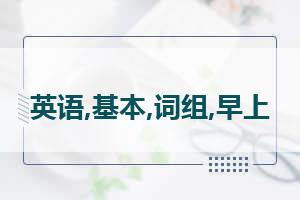
a door of the house
十一、课本中的知识点
1、
Unit 1——Unit 2
1)问候语:
Good morning/ afternoon/ evening.
How are you?---
Just OK, thank you. How are you?---Not bad, thanks.
Hi! Hello!
How do you do?
2)道别用语:
Nice/ Glad to meet/ see you.(meet用于初次见面,see用于熟人间)
Nice to meet/ see you, too.
Goodbye. Byebye. Bye. See you(later/ tomorrow/ next time)! So long! Good
night!
3)介绍人或
者物的句型:This is...
4)Excuse me.与I'm sorry.的区别:
Excuse me.是要引起对方的注意,而
I'm sorry.则是向对方道歉。
5)词组be from= come from
in English
5)当问句中问到this/ that时
,回答要用it;问到these/ those时,要用they来回答。例如: What's this in English?----
It's an eraser.
What are those?----They are books.
6)对Thanks.的回答:
That's OK./ You're welcome./ My pleasur.
7)look the same= have the same looks
give sth. to sb.= give sb. sth.
be like= look like
in the tree/ on the tree(树上结的、长
出来的用on,否则用in)
in red(穿着红色的衣服)
in the desk(在空间范围之内)
in English(用
英语)
help sb. do sth.
8)both与all的区别:
both表示“两者都......”;all表示“三者及以上都
......”。
2、Unit 3——Unit 4
1)speak的用法
speak与say不同:speak表示“说”的动作,不表示
“说”的内容;say则表示“说”的内容。
speak后面除了能接“语言”外,不能直接接东西,后面加了
to则表示“对......说”。
help sb. with sth.(帮助某人做/补习......)
want to do sth.(
想要做某事)
would like to do sth.
not...at all(一点都不);Not at all.(没关系/别介意)
like...a lot= like...very much
2)some和any的区别:
口诀:some用于肯定句,否定、疑问变any。
例如:
I have some money.
I don't have any money.
Do you have any money?
3)
have a seat= take a seat(请随便坐)
4)祈使句(表示命令或请求的句子)
祈使句一般都省略了主
语You,所以其否定句直接用Don't开头。例如:
Don't go there!
5)问职业:
What does sb. do?
What is sb.?
What's sb.'s job?
6)work与job的区别:
work是未必有报酬的“工作”,例如
homework, housework;而job则一定是有报酬的“工作”。
7)on指在物体的表面,不论这个面是否水平
的,例如:
on the desk/ wall/ farm/ playground
8)in hospital(住院);in the hospital(在医
院里)
look after(照料/照顾/照看)
help oneself(请自便/随便吃)
9)表示“建议”的句型:“
做某事如何?”
What about(doing) sth.?(英式英语)
How about(doing) sth.?(美式英语)
Why don't you do sth.?= Why not do sth.?
10)“吃”一日三餐要用have:
have breakfast/ lunch/ supper
have...for breakfast/ lunch/ supper
take one's order
be kind to sb.
11)try on这个词组可合可分:名词可以放在这个词组的中间或后面,但代词只能放在
词组的中间。
12)在口语中往往用take表示“买”。
13)how many与how much的区别:
how many 可
数名词;how much 不可数名词
14)What do you think of...?是询问对方对某事物的看法;
How do you like...?是问对方对某事物喜欢的程度。
think about(考虑)
Thank you all the same.(即使对方没能帮上忙,也要礼貌道谢)
Thanks.= Thank you.
(thank作为动词,不能单独使用。)
15)one与it的区别:
当上下文说的是同一种类事物时,任意一个
可以用one来代替;如果上下文所说的是同一个事物时则用it。例如:
Ann:I have a yellow bag.
Jane:I have a green one.
Tom: Hey, Mike. Where is your bike?
Mike: Look, it's over there.
16)倒装句
Here you are.
Here it is.
17)be free(有空/免费
)
forget to do sth.(忘了去做某事)
forget doing sth.(忘了做过某事)
What's up?= What's wrong with...?= What's the matter with...?
18)go v.-ing结构的含义:
为了实现某目的才去的。例如:
go fishing/ boating/ swimming/ shopping等
19)have to do sth.(
非主观因素,强调客观因素,“不得不去做某事”)
must则表示主观愿望
20)
fly a kite= fly kites
be free= have time
21)时间的表述
当分针所指的时间大于0分、小于等于
30分钟时,用“分钟”past“小时”。例如:
8:23——twenty-three past eight
当分针所指的时间大
于30分钟、小于60分钟时,用“剩余的时间”to“下一个整点”。例如:
8:49——eleven to nine
当
然,还可以直接按照小时、分钟去读出时间,例如:
8:23——eight twenty-three; 8:49——
eight forty-nine
整点则在数词后加“-o'clock”,例如:8:00——eight o'clock
在钟点前介词要用
at.
22)句型“该干某事了。”:It's time to do sth.= It's time for sth.
例如:该吃午饭了.
It's time to have lunch.= It's time for lunch
三、初一上学期英语知识点
知识是青年人的最佳的荣誉,老年人最大的慰藉,穷人最宝贵的财产,富人最珍贵的装饰品。下面我给大家分享一些初一上学期英语知识,希望能够帮助大家,欢迎阅读!
初一上学期英语知识1
Unit1 My name’s Gina.
【重点短语】
1. my name我的名字
2. your name你的名字
3. her name她的名字.
4. his name他的名字
5. I’m...我是……
6. first name名字
7. last name/family name姓氏
8. Ms. Brown布朗女士
9. your school ID card你的学生卡
10. phone/telephone number电话号码
11. his ID card number他的身份证号码
12. my friend我的朋友
13. nice to meet you很高兴见到你
14. middle school中学
15. in China在中国
【重点句型】
1.— What’s your name?你叫什么名字?
一I’m/M y name is Alan.我叫艾伦。
2.— What’s his/h e r name?他/她叫什名字?
--His/Her name is Eric/Mary.他/她叫埃里克/玛丽。
3. My friend is Eric Brown.
我朋友叫埃里克?布朗。
4. My friend is in China.
我朋友在中国。
5.— What’s your last name?你姓什么?
—-My last name is Green.我姓格林。
6.— My name’s Jenny Green.我的名字是珍妮?格林。
—I’m Gina. Nice to meet you!我是吉娜。很高兴见到你
7.— What’s your telephone number?你的电话号码是多少?
一I t’s 281-9176.我的电话号码是281-9176
8.—Are you Helen?你是海伦吗?
— Yes, I am.是的,我是。
11.— Is he Jack?他是杰克吗?
— Yes, he is./N o,he isn’t.是的,他是。/不,他不是。
【重点单词】
name/neim/ n.名字;名称
nice/nais/ adj.令人愉快的;宜人的
to/tu:/常用于原形动词之前,该动词为不定式
meet/mi:t/ v.遇见;相逢
too/tu:/ adv.也;又;太
your/j?:/ pron.你的;你们的
Ms./miz/(于女子的姓名前,不指明婚否)女士
his/hiz/ pron.他的
and/?nd/ conj.和;又;而
her/h?:/ pron,她的
yes/jes/ interj.是的;可以
she/?i:/ pron.她
he/hi:/ pron.他
no/n?u/ interj.不;没有;不是
not/n?t/ adv.不;没有
zero/'zi?r?u/ num.零
one/w?n/ num.一
two/tu:/ num.二 three/θri:/ num.三
four/f?:/ num.四 five/faiv/ num.五
six/siks/ num.六
seven/'sevn/ num.七
eight/eit/ num.八
nine/nain/ num.九
telephone/'telif?un/ n.电话;电话机
number/'n?mb?/ n.号码;数字
phone/f?un/ n.电话;电话机
telephone/phone number电话号码
first/f?:st/ adj.第一
first name名字
last/la:st/ adj.最后的;末尾的
last name姓
friend/frend/ n.朋友
China/'t?ain?/中国
middle/'midl/ adj.中间的;中间
school/sku:l/ n.学校
middle school中学;初中
初一上学期英语知识2
Unit2 This is my sister.
【重点短语】
1. an uncle/aunt叔叔/阿姨
2. his aunts and uncles他的阿姨和叔叔们
3. my four friends我的四个朋友
4. his parents他的父母
5. my family我的家
6. your brother/sister你的兄弟/姐妹
7. these two girls这两个女孩
8. in Picture 1/in the first picture在第一张图片里
9. have a good day过得愉快
10. my family photo我家的全家福
11. a photo of my family我家的一张照片
12. the name of my dog我的狗的名字
13. in my family在我家里
14. two photos/pictures两张照片
【重点句型】
1. This is my friend Jane.这是我的朋友简。
2. These are my brothers.这些是我的兄弟们。
3. Those are my brothers.那些是我的兄弟们。
4. That’s my family.那是我的全家。
5.—Are those/these your parents?那/这些是你的父母吗?
—Yes,they are.是的,他们是。
6.— Who's he?他是谁?
— He’s my brother,Paul.他是我的兄弟,保罗。
7.一Who are they?他们是谁?
—They’re my grandparents.他们是我的祖父母。
8. Here are two nice photos of my family.
这是我家两张漂亮的照片。
9. My grandfather and grandmother are in the first photo.
我爷爷和奶奶在第一张照片里。
10. In the next picture are my brothers, Bob and Eric.
我的兄弟鲍勃和埃里克在下一张照片里。
【重点单词】
sister/'sist?/ n.姐;妹
mother/'m???/ n.母亲;妈妈
father/'fa:??/ n.父亲;爸爸
parent/'pe?r?nt/ n.父(母)亲
brother/'br???/ n.兄;弟
grandmother/'gr?nm???/ n.(外)祖母;奶奶
grandfather/'gr?nfa:??/ n.(外)祖父;爷爷;
grandparent/'gr?npe?r?nt/ n.祖父(母);
family/'f?m?li/ n.家;家庭
those/??uz/ pron.那些
who/hu:/ pron.谁;什么人
oh/?u/ interj.哦;啊
these/?i:z/ pron.这些
they/?ei/ pron.他(她、它)们
well/wel/ interj.嗯;好吧
have/h?v/ v.经受;经历
Have a good day!(表示祝愿)过得愉快!
bye/bai/ interj.(=goodbye)再见
son/s?n/ n.儿子
cousin/'k?zn/ n.堂兄(弟、姐、妹);表兄
grandpa/'gr?npa:/ n.(外)祖父;爷爷;外公
mom/m?m/,/ma:m/ n.(=mum)妈妈
aunt/a:nt/ n.姑母;姨母;伯母;婶母;舅母
grandma/'gr?nma:/ n.(外)祖母;奶奶;外婆;
dad/d?d/ n.爸爸
uncle/'??kl/ n.舅父;叔父;伯父;姑父;舅父
daughter/'d?:t?/ n.女儿
here/hi?/ adv.(用以介绍人或物)这就是;在这里
photo/'f?ut?u/ n.照片
of/?v,?v/ prep.属于(人或物);关于(人或物)
next/nekst/ adj.&n.下一个(的);接下来(的)
picture/'pikt??/ n.照片;图画
girl/g?:l/ n.女孩
dog/d?g/ n.狗
初一上学期英语知识3
Unit3 Is this your pencil?
【重点短语】
1. your schoolbag你的书包
2. his green pen他的绿色的钢笔
3. Anna’s books安娜的书
4. her dictionary她的字典
5. ask the teacher for...向老师要……
6. thank you for...因........而谢谢你
7. computer games电脑游戏
8. in Classroom 7E在7 E教室里
9. in the school library在学校图书馆
10. call me给我打电话
11. call me at 495-3539拨4 9 5-3 5 3 9打电话给我
12. e-mail me at...用……给我发电子邮件
13. my school ID card我的学生卡
14. a set of keys一串钥匙
15. some keys一些钥匙
【重点句型】
1.— What’s this?这是什么?
—It’s a watch.一块手表。
—How do you spell it?你如何拼写它?
W-A-T-C-H. W-A-T-C-H。
2.—Is this/that your pencil?这是/那是你的铅笔吗?
—Yes, it is. It’s mine./No, it isn’t. It’s his.是的。它是我的。/不。它是他的。
3.—Excuse me,is this your pencil?打扰一下,请问这是你的铅笔吗?
—Yes,thank you.是的,谢谢你。
4.—Are these your books?这些是你的书吗?
—Yes, they are. They are mine.是的。它们是我的。
5.一Are those your keys?那些是你的钥匙吗?
—No,they aren’t. They’re Bob.不。它们是鲍勃的。
6. Thank you for your help.谢谢你的帮助。
7.—The blue pen is his.这支蓝色钢笔是他的。
—What about this dictionary?那这本字典呢?
8.I lost my school ID card. I must find it.
我丢了我的学生卡。我必须找到它。
【重点单词】
pencil/'pensl/ n.铅笔
book/buk/ n.书
eraser/i'reiz?/ n.橡皮
box/b?ks/ n.箱;盒
pencil box铅笔盒;文具盒
schoolbag/'sku:lb?g/ n.书包
dictionary/'dik??n?ri/ n.词典;字典
his/hiz/ pron.他的
mine/main/ pron.我的
hers/h?:z/ pron.她的
excuse/ik'skju:z/ v.原谅;宽恕
me/mi:/ pron.(I的宾格)我
excuse me劳驾;请原谅
thank/θ??k/ v.感谢;谢谢
teacher/'ti:t??/ n.老师;教师
about/?'baut/ prep.关于
What about...?(询问消息或提出建议..怎么样?
yours/j?:z/ pron.你的;你们的
for/f?:/ prep.为了;给;对
thank you for...为......而感谢
help/help/ v.&n.帮助;援助
welcome/'welk?m/ adj.受欢迎的
You're welcome.别客气。
baseball/'beisb?:l/ n.棒球
watch/w?t?/ n.表;手表
computer/k?m'pju:t?/ n.计算机;电脑
game/geim/ n.游戏;运动;比赛
card/kɑ:d/ n.卡片
ID card学生卡;身份证
notebook/'n?utbuk/ n.笔记本
ring/ri?/ n.戒指
bag/b?g/ n.袋;包
in/in/ prep.在......里
library/'laibr?ri/ n.图书馆
ask/ɑ:sk/ v.请求;要求;询问
ask...for...请求;恳求(给予)
find/faind/ v.(过去分词 found)找到;发现
some/s?m/ adj.一些;某些
classroom/'klɑ:sru:m/ n.教室
e-mail/'emeil/ n.(=email)电子邮件
at/?t/ prep.按照;根据;在(某处、某时间时刻)
call/k?:l/ v.(给......)打电话
lost/l?st/ v.(动词lose的过去式)遗失;丢失
must/m?st/ modal v.必须
set/set/ n.一套;一副;一组
a set of一套;一副;一组
初一上学期英语知识4
Unit4 Where’s my schoolbag?
【重点短语】
1. my pencil box我的铅笔盒
2. on the sofa在沙发上
3. in your schoolbag在你的书包里
4. under your bed在你的床底下
5. in your grandparents’ room在你祖父母的房间里
6. a tape player一台录音机
7. a model plane一个飞机模型
8. English books英语书
9. in the bookcase在书柜里
10. under the radio在收音机下面
11. on the teacher’s desk在讲台上
12. on your head在你头上
【重点句型】
1.—Where’s the schoolbag?书包在哪里?
— I t’s under the table.在餐桌下。
2.— Where are my books?我的书在哪里?
—They’re on the sofa.在沙发上。
3.Where is your ruler?
你的尺子在哪里?
4.—Where’s my bag?我的包在哪里?
—Is it on your desk?在你的书桌上吗?
5.It’s not under the chair.
它不在椅子下面。
6.I think it’s in your grandparents’ room.
我想它在你祖父母的房间里。
7.I‘m tidy,but Gina is not.
我(东西放得)整齐,但吉娜不整齐。
8.I have a clock.
我有一台钟。
9.Gina’s books are everywhere.
吉娜的书到处乱放。
【重点单词】
where/we?/ adv.在哪里;到哪里
table/'teibl/ n.桌子
bed/bed/ n.床
bookcase/'bukkeis/ n.书架;书柜
sofa/'s?uf?/ n.沙发
chair/t?e?/ n.椅子
on/?n/ prep.在.......上
under/'?nd?/ prep.在.......下
come/k?m/ v.来;来到
come on快点儿
desk/desk/ n.书桌
think/θi?k/ n.认为;想;思考
room/ru:m/ n.房间
their/?e?/ pron.他(她、它)们的
hat/h?t/ n.帽子
head/hed/ n.头
yeah/je?/ interj.是的;对
know/n?u/ v.知道;了解
radio/'reidi?u/ n.收音机;无线电广播
clock/kl?k/ n.时钟
tape/teip/ n.磁带;录音带;录像带
player/plei?/ n.播放机
tape player录音机
model/'m?dl/ n.模型
plane/plein/ n.飞机
model plane飞机模型
tidy/'taidi/ adj.整洁的;井井有条的
but/b?t/ conj.但是
our/'au?/ pron.我们的
everywhere/'evriwe?/ adv.处处;到处;各地
always/'?:lweiz/ adv.总是
初一上学期英语知识5
Unit5 Do you have a soccer ball?
【重点短语】
1. have a volleyball有一个排球
2. play volleyball/tennis打排球/网球
3. have a ping-pong/table tennis有一个乒乓球
4. play ping-pong/table tennis打乒乓球
5. with our friends和我们的朋友一起
6. have a football/soccer ball有一个足球
7. play football/soccer踢足球
8. at school在校,在上学
9. play sports做运动
10. play computer games玩电脑游戏
11. watch TV看电视
12. in the same school在同一所学校
13. after class下课后
14. go to school去上学
【重点句型】
1.—Do you have a ping-pong bat?你有一个乒乓球拍吗?
—No, I don’t.不,我没有。
2.—Do they have a computer?他们有一台电脑吗?
—Yes, they do./No, they don't.是的,他们有。/不,他们没有。
3.—Does he have a tennis ball?
他有一个网球吗?
—Yes,he does./No, he doesn’t.是的,他有。/不,他没有。
4. He has two ping-pong bats.
他有两个乒乓球拍。
5. They have a computer.
他们有一台电脑。
6. I don't have a soccer ball, but my brother does.
我没有足球,但是我兄弟有。
7. She doesn’t have a volleyball.
她没有排球。
8. Let’s play basketball!
让我们(一起)去打篮球吧!
9. That sounds good.
那听起来不错哦。
10.— Let's play computer games!让我们(一起)玩电脑游戏吧!
一That sounds interesting.那听起来很有趣。
11. We go to the same school and we love soccer.
我们去同一所学校上学,我们热爱足球。
12. We play soccer at school with our friends. It’s relaxing.
我们在学校里和朋友踢足球。这很放松。
13. I don’t have a soccer b all, but Alan does.
我没有足球,但艾伦有。
14. I like ping-pong. It's easy for me.
我喜欢打兵兵球。这对我来说很容易。
15. Let me get it.
让我去拿吧。
【重点单词】
do/du:/ aux v.&v.用于否定句疑问句;做;干
have/h?v/ v.有
tennis/'tenis/ n.网球
ball/b?:l/ n.球
ping-pong/'pi?p??/ n.乒乓球
bat/b?t/ n.球棒;球拍
soccer/'s?k?/ n.(英式)足球
soccer ball(英式)足球
volleyball/'v?lib?:l/ n.排球
basketball/'ba:skitb?:l/ n.篮球
hey/hei/ interj.嘿;喂
let/let/ v.允许;让
us/?s/ pron.(we的宾格)我们
let's= let us让我们(一起)
go/g?u/ v.去;走
we/wi:/ pron.我们
late/leit/ adj.迟到
has/h?z/ v.(have的第三人称单数形式)有
get/get/ v.去取(或带来);得到
great/greit/ adj.美妙的;伟大的
play/plei/ v.参加(比赛或运动);玩耍
sound/saund/ v.听起来好像
interesting/'intr?sti?/ adj.有趣的
boring/'b?:ri?/ adj.没趣的;令人厌倦的
fun/f?n/ adj.有趣的;使人快乐的n.乐趣;快乐
difficult/'difik?lt/ adj.困难的
relaxing/ri'l?ksi?/ adj.轻松的;令人放松的
watch/w?t?/ v.注视;观看
TV/ti:'vi:/ n.(=television)电视;电视机
watch TV看电视
same/seim/ adj.相同的
love/l?v/ v.&n.爱;喜爱
with/wi?/ prep.和......在一起;带有;使用
sport/sp?:t/ n.体育运动
them/?em/ pron.(they的宾格)他(她、它)们
only/'?unli/ adv.只;仅
like/laik/ v.喜欢;喜爱
easy/'i:zi/ adj.容易的;不费力的
after/'a:ft?/ prep.在......以后
class/kla:s/ n.班级;课
classmate/'kla:smeit/ n.同班同学
初一上学期英语知识点相关文章:
★七年级英语上册各单元知识点汇总
★初一英语上学期知识点归纳
★七年级英语语法知识点整理
★七年级英语上册语法学习知识点总结
★初一英语上册必备知识点归纳
★初一上册英语语法知识点归纳
★初一英语上册知识点
★新人教版七年级上册英语知识点汇总
★七年级上册英语知识点汇总
★初一英语语法知识点总结复习
初一上学期英语的介绍就聊到这里吧,感谢你花时间阅读本站内容,更多关于求初一上册的英语基本句型、初一上学期英语的信息别忘了在本站进行查找哦。
